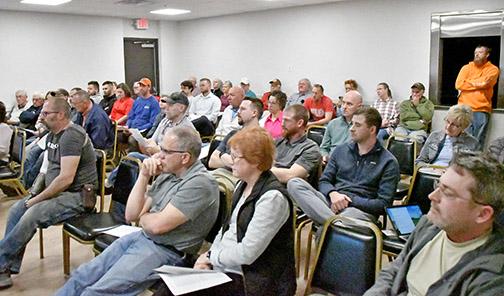‘Yes We Can’ committee says raising levy lid suggests plan is tax increase, not a shift
More than 50 people attended a “Yes we can” town hall meeting Thursday at the Bremer Center, where a group of local residents explained why they believe Aurora can continue to grow without adding a 1-1/2 percent sales tax, and in fact why they fear that a sales tax could impede future growth.
Mayor Marlin Seeman explained why the city put the sales tax question on the May 14 ballot in last week’s ANR, though a “Yes we can” group is challenging that rationale and invited local residents to do some homework before casting their ballots.
“The first point that I’m going to talk about is that this resolution is set up as a tax increase, not a tax shift,” said Jim Ediger, a local attorney who is currently president of the Aurora Development Corporation. Ediger, like all three panelists at the head table, said they were speaking on their own behalf, not of the various entities they work with. “You’ve heard a lot about what’s going on in Lincoln and the governor’s proposal to have a tax shift from property taxes to sales tax,” Ediger continued. “That’s not what this one does.”
Ediger reported that a 1-1/2 percent city sales tax would generate an estimated $1.3 million in annual revenue. (Editor’s note: The ANR reported last week that Aurora’s net taxable sales in 2023 was listed at $67.2 million, which would generate $1,008,541 in sales tax. That number did not include vehicle taxable sales, which would add approximately $300,000 to the annual total.)
“If the resolution specifically stated that this would be a dollar for dollar offset of property taxes, like they’re trying to do in Lincoln, I think the conversation would be a lot different tonight,” Ediger said. “I think a lot of people support what the governor is trying to do and a true dollar for dollar tax reduction on your property taxes, but that’s not what this resolution does.”
Ediger noted that the city’s tax request last year was about $2 million, thus an estimated $1.3 million in additional sales tax revenue would increase taxes collected by the city more than 50 percent. He also pointed out that the city’s resolution asks voters to approve a 24 percent lid increase, which represents more than $1 million.
“Again, if we look at what’s going on in Lincoln, the governor is not encouraging local municipalities to raise your taxes by 50 percent,” he said, adding that the governor’s tax plan is in question with just days remaining in the legislative session. “So we’re really trying to use what’s going on at the state level as justification for passing a 1-1/2 percent sales tax in our community. We think it’s both premature and really inconsistent with the governor’s tax policy.”
Jannelle Seim addressed the Aurora City Council in February, voicing her concerns with a proposal she said was not well defined or understood. She raised some of the same concerns Thursday, this time adding more detail.
“My point that I have, which I’ve kind of been pounding the table about since hearing this, is that there is no specific purpose and there is no end clearly stated in this resolution,” Seim said. “There is a broad list of areas, which again include reduction in property tax, economic development, recreation, public safety, and civic and social activities. And then there’s a catch-all to maintain the level of municipal services desired by the citizens, which is very broad. It is not specific in any way. I think our concern is that there is no accountability as to how that money is distributed amongst these categories.”
Tax lid increase
Wade Regier focused his initial comments on the second part of the city’s resolution, which asks taxpayers to approve a one-time $1 million increase in the city’s tax lid.
“The lid is based on revenue, not expenditures,” Regier explained. “We’re really not talking about expenditures here tonight, we’re really just talking about taxing authority and how that relates to the sales tax. If we aren’t aware of any major expenditures out there, other major necessary expenditures that are in front of us, why do we need to raise that lid 24 percent? If this is truly a tax shift, and not a tax increase, we wouldn’t need to raise that, we would just take money from sales tax and offset property taxes.”
Regier referred to another article in last week’s ANR which reported that the city’s auditor pointed out that the city’s cash reserves have been dwindling the last few years, from $1.53 million in 2019 to $681,677 in 2023. That, he suggested, is more of a balance sheet problem than it is a cash flow problem.
“We can restructure debt,” he said. “We can use our lid authority. We can raise property taxes tomorrow and repair our cash reserves. That’s really a very short-term problem. That is not a long-term problem and we can fix that very easily within the taxing authority that we have today.”
Why does Aurora not have a sales tax?
After some introductory comments from each of the three panelists, the focus shifted to a list of questions received from around the community. The first was a very basic question often asked, which is why does Aurora not have a sales tax when so many other Nebraska communities do?
“Aurora is kind of unique in its little hamlet,” Seim noted. “We do things a little bit differently than other communities. We’ve never really relied on grants and things like that to make things work. We are able to build strong businesses, have strong businesses and residential growth without using those (federal spending) programs.”
Seim noted that Aurora is in the midst of a growth spurt now, citing housing developments and expanded economic development which is expected to add $50 million to the city’s tax base in the next 24 months. That growth and expanded valuation, she said, will add $200,000 or more in city tax revenue, in addition to utility revenues generated by those properties.
“This has been the secret sauce of Aurora for decades,” she said. “This dates back to the Ken Wortman days where you rely on yourself and you take care of it yourself, which is exactly what we have done without a sales tax.”
Ediger noted that another element of Aurora’s formula for growth is based in its foundations and commitment to volunteerism and private giving.
“If you talk to anybody across the state they’re really envious about what we’re able to do here with private funds and not using taxpayer dollars,” Ediger said. “So if you look at all of the facilities in town, including the one we’re sitting in right now and the renovation that went on here, the clubhouse at Poco Creek, the practice (golf) facilities, softball/baseball fields and tennis facilities, we have a lot of amazing amenities. Those were funded from private individuals in our community, foundations and our nonprofit organizations that really operate a lot of those.”
Ediger said he believes Aurora will be able to continue funding its community facilities and foster community growth without a sales tax.
“We’re going to continue to have some of the best facilities in the state, especially for a town our size, because of the individuals in our community, because of the foundations, because of our nonprofits,” he said. “I think it’s how a lot of people here were raised, and they know the importance of if we want to have a good community to live in you’ve got to volunteer, you’ve got to open your checkbook when the right project comes up. We usually get a better facility than what you see in most towns when they’re using taxpayer dollars and trying to do the bare minimum.”
That led to another question heard from the community, which is if new city expenditures for business and housing development is what caused the need for the proposed new sales tax and increased revenue lid.
“The answer to that question really is no,” Ediger responded. “The city has been a great partner and with these economic development projects we think they are making a lot of smart investments. They are expending funds to help with streets, water and sewer improvements and our community has really grown because of that, but the reality is that 80 or 90 percent of these projects are funded by developers, builders, homeowners and business owners. So the 10 or 20 percent investment that the city is making in streets, sewer and water is good investment for everybody in this room because they’re recovering all those costs over the next three to five years.”
Ediger reiterated the point that a projected $50 million in new developments will provide the city $200,000 per year in additional revenue.
“We really do think the modest expenditures that are being invested by the city to support the growth in these projects are more than being offset by the resulting property tax and utility-related revenues,” Ediger added. “We think these are smart, long-term decisions that the city is making. Taxpayers are winners here and we really do think that what we have going on now covers it and that there’s no sales tax that’s needed.”
The next question focused on if the city needs additional funds from a new sales tax and raising the revenue lid to fund safety, street, recreational and other city services. Regier referred to the city’s recent and projected growth as a means of finding the necessary tax revenues.
“Our growth rate over the last two or three years has been tremendous,” he said. “I would look back at a 10-year period and we’re doing 7 percent growth rate in valuation. That’s not necessarily tax revenues, but that’s our valuation that we’re building upon. That’s a phenomenal number around Nebraska.
“However, if you look into that budget, there are some significant cost increases,” Regier added. “It’s been a wild few years and the inflation bug has kind of evolved, and it’s no different for the city. They’re facing those same challenges. Their expenditures are continuing to climb at a pretty quick rate. But as we just mentioned, the growth that we have coming online will be more than enough to satisfy those additional requirements for the city budget line items.”
What is the downside to passing a sales tax?
As president of the Aurora Housing Development Corporation, Seim noted that the community is benefiting now from two $1 million Rural Workforce Housing grants, which combined with more than $1 million in local match dollars has provided $3.5 million to help fuel a housing growth spurt in the community. Seim said she is very concerned that adding a sales tax now could threaten some of that momentum.
“This will have an impact on what it costs to build a house,” she said. “It’s harder than you would think to build a house for less than $325,000, and when you add a 1-1/2 percent sales tax that just makes is that much harder and it makes it that much less desirable for developers to come in. So I’m super concerned about what this will do to our project that we already have underway and then several that are coming, not to mention all of the amazing work that ADC has done to bring in the enterprises that are coming in,” including Kiner Inc., Specialty Ag Formulations and AAIM Data Centers. “We brought these folks here under the premise that we don’t have a sales tax so this is not going to be in your budget. This just makes it that much more difficult for them. It will impact growth. It will impact our ability to spend our money and rising the lid is just a concern.”
Who pays a sales tax?
One key question brought up in various ways throughout the evening focused on what items are subject to a local sales tax, and how high a percentage might be paid by residents outside of Aurora. (See related info box)
As to the question of who would pay a sales tax charged in Aurora, the panel concluded that a majority of the projected $1.3 million sales tax revenues would be paid by local residents.
“Our committee’s projections are that 85 to 90 percent of local sales tax will be paid by the residents,” Seim said. “I’ve heard the arguments that there will be a ton of money collected from Love’s, using people in town for stuff or at the interstate, and I’m not denying that they won’t collect that. But we estimated that to be about $100,000 to $200,000, which is not insignificant. So we are taxing ourselves over $1 million to collect $100,000 or even $200,000. It just doesn’t make sense to me.”
On a related note, Aurora’s “pull factor,” a term used by the Nebraska Public Power District to measure non-motor vehicle retail sales on a per capita basis, reflects a significant amount of retail leakage. The community’s most recent pull factor number from 2022 was listed at .87, compared to 1.93 in York, 1.57 in Grand Island, 1.17 in Hastings, .80 in Stromsburg, .79 in Geneva, .79 in Central City, and .61 in Sutton.
Seim went on to say that the committee estimated that the annual per-house cost of a local sales tax would be $555.
“It’s a tax on you and me, that’s the bottom line,” she said. “It’s money out of my pocket, something out of your pocket.”
Following the panel’s presentation, members of the audience asked a few questions, which prompted a comment from Regier on the notion of a sales tax being a form of regressive tax.
“What bothers me the most is this is a regressive tax,” Regier said. “If I have a single-parent neighbor raising two kids, they are paying a significantly higher percentage of tax than I am, unfortunately, because of where they’re at in their life. This community has never had a regressive tax and I think it’s part of, as Jannelle says, our secret sauce.”
Also asked my someone in the audience was the question, “What can Aurora residents do?”
“That’s an easy one,” Regier concluded. “Run for city council. We need more people to do their homework. There is a lot of good information out there that you can get through the Nebraska Department of Revenue’s website and the (state) auditor’s website. A lot of this homework you can do and form your own opinions based on the information that you determine. I think that’s the key is being an informed citizen.”
On a final note, Ediger urged citizens to keep the conversation civil.
“I wasn’t around the last time the sales tax was voted on, but I was told that it was a very divisive time in our community,” he said. “I’m hoping we can avoid that this time around. There is no reason for anything to get personal here. I think people need to understand that civil discourse needs to happen in small communities. There is no doubt in my mind that the folks of the city had the best intentions with what they’re trying to do, so I guess with my closing remarks, just keep things civil.”





